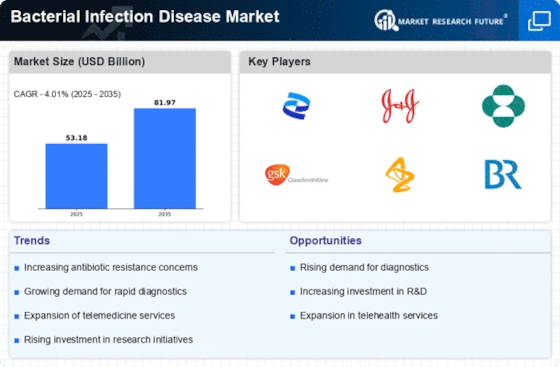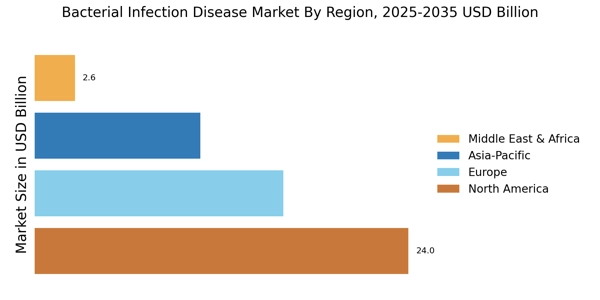Investment in Research and Development
Investment in research and development (R&D) is a crucial factor propelling the Bacterial Infection Disease Market. Pharmaceutical companies are increasingly allocating resources to discover new antibiotics and alternative therapies to combat resistant strains of bacteria. In recent years, R&D spending in the sector has seen a notable increase, with estimates suggesting that it could reach billions of dollars annually. This financial commitment is essential for developing novel treatments that can effectively address the challenges posed by antibiotic resistance. As a result, the Bacterial Infection Disease Market is poised for expansion, driven by the continuous innovation and introduction of new products.
Rising Awareness of Bacterial Infections
Rising awareness of bacterial infections among the general population and healthcare professionals is significantly influencing the Bacterial Infection Disease Market. Educational campaigns and public health initiatives have contributed to a better understanding of the symptoms and risks associated with bacterial infections. This heightened awareness is leading to earlier diagnosis and treatment, which is crucial in managing infections effectively. Furthermore, as patients become more informed, they are more likely to seek medical attention, thereby increasing the demand for diagnostic tests and treatment options. Consequently, the Bacterial Infection Disease Market is likely to benefit from this trend, as healthcare providers respond to the growing need for effective solutions.
Growing Incidence of Bacterial Infections
The rising incidence of bacterial infections is a primary driver of the Bacterial Infection Disease Market. Reports indicate that bacterial infections are becoming increasingly prevalent, with millions of cases reported annually. This surge is attributed to various factors, including urbanization, changes in lifestyle, and increased exposure to pathogens. The World Health Organization has noted that infections such as pneumonia and urinary tract infections are among the most common, leading to a heightened demand for effective treatment options. As healthcare systems strive to manage these infections, the Bacterial Infection Disease Market is likely to experience substantial growth, driven by the need for innovative therapies and antibiotics.
Technological Advancements in Treatment Options
Technological advancements in treatment options are reshaping the Bacterial Infection Disease Market. Innovations such as targeted therapies, combination treatments, and the development of bacteriophages are emerging as potential solutions to combat bacterial infections. These advancements not only enhance treatment efficacy but also reduce the risk of side effects associated with traditional antibiotics. The integration of technology in treatment protocols is expected to improve patient outcomes and streamline healthcare processes. As these new technologies gain traction, the Bacterial Infection Disease Market is likely to witness a shift towards more effective and personalized treatment strategies.
Increased Regulatory Support for Antibiotic Development
Increased regulatory support for antibiotic development is a significant driver of the Bacterial Infection Disease Market. Regulatory agencies are recognizing the urgent need for new antibiotics to address the growing threat of antibiotic resistance. Initiatives aimed at expediting the approval process for novel antibiotics are being implemented, which may encourage pharmaceutical companies to invest in antibiotic research. This supportive regulatory environment is crucial for fostering innovation and ensuring that new treatments reach the market more swiftly. As a result, the Bacterial Infection Disease Market is expected to grow, driven by the influx of new products that can effectively combat bacterial infections.

















